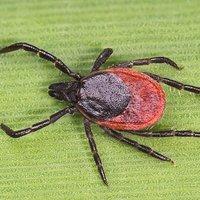Ticks & Lyme Disease: What Everyone In Boston Ought To Know
It is not healthy to live in constant fear of everything that could go wrong, but it is wise to know what threats exist and what you can do to avoid them. One danger you should be aware of are ticks and, more specifically, the diseases they carry. To help you better understand these harmful pests and Lyme disease, one of the most common and dangerous diseases ticks carry, here is are everything you need to know.
Most Common Ticks In Boston
There are a number of tick species that live in America. Here in Boston, the deer tick is the most common. You can identify deer ticks by their small ⅛” long orange-brown, flat oval-shaped bodies, and dark legs. When engorged with a blood meal, deer ticks can grow five times larger and take on a reddish color.
To feed on humans and animals, deer ticks use their visibly sharp mouthparts to pierce and latch onto the skin. After their head is buried, they drain blood until full and then detach. Unlike fleas, ticks do not live on their hosts but return to the ground after every meal.
What Is Lyme Disease?
Ticks do not cause Lyme disease; they only spread it. Nematode worms, microscopic parasites that ticks sometimes carry, spread Lyme disease. These tiny parasites release burgdorferi, a causative agent of Lyme disease, into the bloodstream.
Untreated Lyme disease can have many symptoms. Early signs include fever, headaches, chills, fatigue, muscle and joint aches, and swollen lymph nodes. Often times, early symptoms of Lyme disease are confused for other common ailments. If symptoms progress into severe headaches, neck stiffness, rashes across your body, facial palsy, arthritis with severe joint pain and swelling, pain in your tendons, joints, bones, and muscles, an irregular heartbeat, episodes of dizziness, shortness of breath, nerve pain, shooting pains, numbness, tingling, or inflammation of the brain or spinal cord, seek medical attention immediately.
If you catch a tick mid-meal, use a pair of tweezers to pull it out. Make sure not to squeeze too hard, and pinch as close to your skin as possible. The last thing you want is to leave the tick's head beneath your skin. Once removed from your skin, store the tick inside a small sealed plastic bag inside the freezer. This will give doctors a potential vector to study if you develop symptoms of Lyme disease, and is the fasted way to receive treatment to get well.
How To Prevent Ticks
There are 30,000 cases of Lyme disease reported each year in the United States. To keep yourself and your family out of this statistic, here are some prevention tips you should be using.
- Trim your grass weekly.
- Make sure your hedges, trees, and landscaping are well-maintained.
- Build a fence around your garden and yard to keep out wildlife.
- Move bird feeders and birdbaths away from your home’s exterior.
- Seal the exterior of your home so that wildlife cannot get inside.
- Reduce moisture around your home.
- Invest in high-quality tick control for your yard.
For the absolute best pest control services, get the professionals at Urbanex involved. Our team has everything your home and property needs to fight back against pests, year-round. When your health is on the line, don’t settle for anything but the best. Trust Urbanex. Let us guard your property against ticks.
Reach out to our team today to schedule a service visit for your Boston home.
Request Your Free Inspection
Complete the form below to schedule your no obligation inspection.

